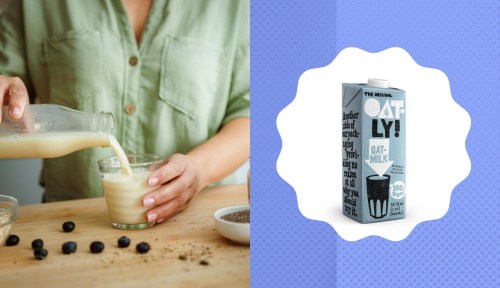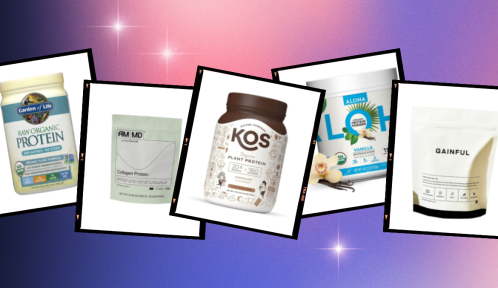Our editors independently select these products. Making a purchase through our links may earn Well+Good a commission
It’s hard to count the reasons why so many of us love oat milk. From its creamy, delicious taste and texture, its versatility, and, of course, its lack of lactose (sensitive guts, rejoice!), the list of why this popular “alt milk” continues to be a staple in our morning latte routine goes on and on. But the latest reason we’re loving it? Its vitamin D content, which can trump that of a glass of unfortified cow’s milk.
Experts in This Article
registered dietitian
ICYMI, vitamin D plays a pivotal role in nurturing our bodies from the inside out. From fortifying bones through enhanced calcium absorption, to potentially reducing the risk of chronic diseases and even bolstering mood regulation, vitamin D is an unsung hero that deserves a prime spot in everyone’s wellness routine—and all you have to do is pour yourself a glass of oat milk to get it.
That said, not all oat milks are as nutritious as others. Scroll to find the best, dietitian-approved oat milks at a glance (approved by me, an RD!) before you stock your ‘fridge.
The best oat milks, at a glance:
- Chobani Original Oatmilk, $5
- Oatly Original Oat Milk, $6
- Califia Farms Extra Creamy Oatmilk, $6
- Planet Oat Unsweetened Vanilla Oatmilk, $5
- Silk Original Oat Milk, $5
- Pacific Foods Original Organic Oat Milk, $5
The importance of vitamin D
Vitamin D carries out a multitude of important functions throughout the body. It plays an integral role in calcium absorption as well as bone, metabolic, cell, immune system, and neuromuscular health. Ideally, adults between the ages of 19 and 70 should aim to consume approximately 15 micrograms (mcg) or 600 International Units (IU) per day to reap these benefits. And while sitting in the sunshine (the most natural source of vitamin D) for about 30 minutes per day can help you get close to meeting these needs, many of us living far from the equator need to turn to food or supplementation to avoid deficiency.
A nutritional breakdown of regular cow’s milk
For comparison, here’s a nutritional breakdown of unfortified cow’s milk, per the United States Department of Agriculture (USDA) food database:
Milk, 1% Fat (1 Cup)
- Calories: 101 calories
- Protein: 8 grams
- Carbohydrates: 12 grams
- Fiber: 0 grams
- Added sugars: 0 grams
- Fat: 2.4 grams
- Saturated fat: 1.5 grams
- Cholesterol: 12 milligrams, 4 percent of Daily Value (DV)*
- Vitamin D: 0 milligrams, 0% DV
- Calcium: 305 milligrams, 27% DV
*Daily Value is based on the average adult needs for males and females without pre-existing conditions per the National Institutes of Health (NIH).
Now, let’s compare those numbers to some of the most nutritious oat milks available for purchase today.
Shop the best oat milks
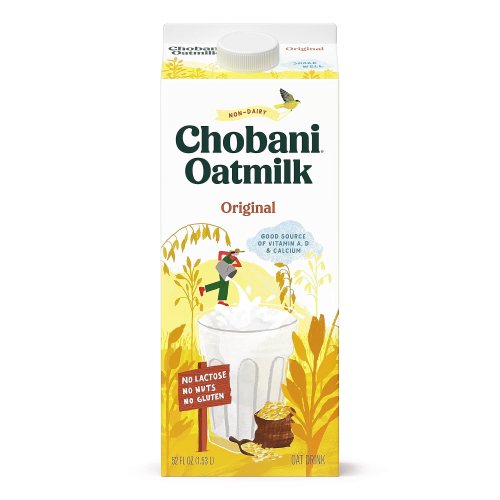
Chobani Original Oatmilk — $5.00
Chobani’s creamy original oat milk is not only a great source of bone-building vitamin D but it also tastes incredible and even froths up just like the real deal. Though the nutrition facts panel does cite some added sugars, these are actually from the oats themselves, not from refined sugar—a major bonus when considering other alternative milks on the market.
Nutrition facts (per serving size of 1 cup)
- Calories: 110 calories
- Protein: 2 g
- Carbohydrates: 13 g
- Fiber: <1 g
- Added Sugars: 7 g
- Fat: 5 g
- Saturated Fat: 0.5 g
- Cholesterol: 0 mg, 0% DV
- Vitamin D: 2 mcg, 13% DV
- Calcium: 130 mg, 10% DV
Pros:
- Contains no refined sugar
- Has affordable price point
- Creamy, delicious taste
Cons:
- Not organic
- Lower protein content
- Contains some additives like thickeners
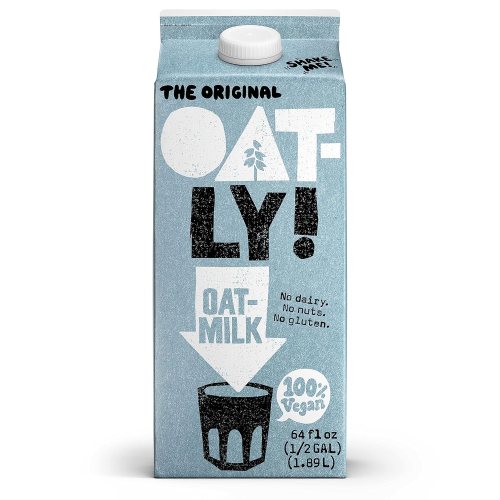
Oatly Original Oat Milk — $6.00
When it comes to fortified oat milks, it’s tough to beat what Oatly has to offer. Not only does it provide 24 percent of your daily vitamin D needs in just one cup, but it also contains more calcium than cow’s milk and 50 percent of your daily vitamin B12 needs (another tough vitamin to get enough of, especially on a plant-based diet). This substitute also has added phosphorus, vitamin A, and riboflavin, making it one of the closest alternatives to real-deal dairy—very impressive!
Nutrition facts (per serving size of 1 cup)
- Calories: 120 calories
- Protein: 2 g
- Carbohydrates: 13 g
- Fiber: 2 g
- Added sugars: 7 g
- Fat: 5 g
- Saturated fat: 0.5 g
- Cholesterol: 0 mg, 0% DV
- Vitamin D: 3.6 mcg, 24% DV
- Calcium: 350 mg, 25% DV
Pros:
- Filled with micronutrients including vitamin D, B12, and A, phosphorus, calcium, and B vitamins
- Short ingredient list of only water, oats, added micronutrients, and rapeseed oil
- No refined sugar
- Widely available nationwide
Cons:
- Not an organic product
- Slightly higher calorie content than cow’s milk
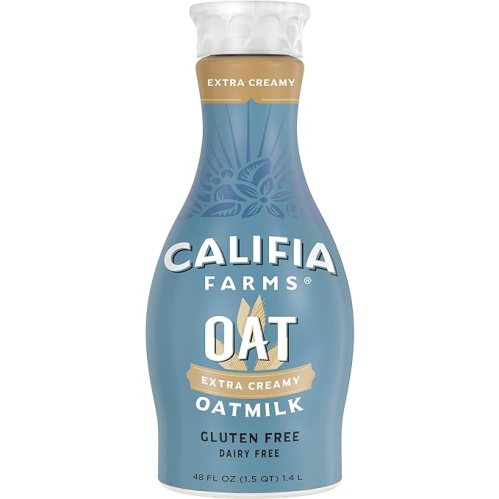
Califia Farms Extra Creamy Oatmilk — $6.00
Califia Farms has an extraordinary line of alternative milk products, but its extra creamy oat milk is one of the best. This substitute contains one of the highest concentrations of vitamin D in the round-up as well as notable amounts of vitamin A, calcium, vitamin E, potassium, and phosphorus for better bone, immune, eye, and heart health. It also contains a lower amount of added sugars compared to others in the list (though, again, naturally created during milk production).
Nutrition facts (per serving size of 1 cup)
- Calories: 110 calories
- Protein: 2 g
- Carbohydrates: 12 g
- Fiber: <1 g
- Added sugars: 4 g
- Fat: 6 g
- Saturated fat: 0.5 g
- Cholesterol: 0 mg, 0% DV
- Vitamin D: 4.4 mcg, 29% DV
- Calcium: 260 mg, 20% DV
Pros:
- Produced by a company committed to sustainability through an array of initiatives, including selling its milk in 100% recycled plastic bottles
- Abbreviated, understandable ingredient list mostly of added vitamins
- Creamy taste perfect for drinking straight-up or in lattes, smoothies, cereal, baked goods and more
Cons:
- Contains sunflower oil which could be a concern for those with seed allergies
- Lower in fiber than other alternatives
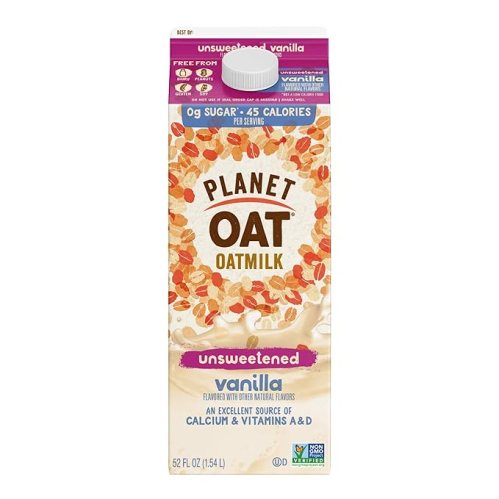
Planet Oat Unsweetened Vanilla Oatmilk — $5.00
If you enjoy a flavored alternative milk, Planet Oat has an incredible option that doesn’t only taste amazing but is also packed with nutrition. With a higher calcium content than cow’s milk and high in vitamin D, vitamin A, and B vitamins, you won’t be missing out on any nutrients when enjoying this substitute. This brand is also one of the few that has less than 50 calories and zero grams of added sugar per cup.
Nutrition facts (per serving size of 1 cup)
- Calories: 45 calories
- Protein: 1 g
- Carbohydrates: 8 g
- Fiber: 1 g
- Added sugars: 0 g
- Fat: 0.5 g
- Saturated fat: 0 g
- Cholesterol: 0 mg, 0% DV
- Vitamin D: 4 mcg, 27% DV
- Calcium: 350 mg, 25% DV
Pros:
- Very low calorie, fat, and carbohydrate content with zero grams of added sugar
- Contains added vitamin A, B vitamins, vitamin D, and calcium
- Unsweetened vanilla flavor is perfect for great tasting, low-calorie drinking and baking
Cons:
- More additives than other brands
- Vanilla flavor prevents use in savory dishes

Silk Original Oat Milk — $5.00
Silk has been blazing the trail for alternative milk products since the 1970s. But gone are the days when soy milk was its sole product. Now, it boasts a remarkable line of alternative milks and plant-based products like yogurt and creamers made from a variety of ingredients.
Its oat milk is especially impressive with a massive 470 mg of calcium and 27 percent of your daily vitamin D needs. It also has a wonderful yet mild taste, perfect for both sweet and savory applications.
Nutrition facts (per serving size of 1 cup)
- Calories: 120 calories
- Protein: 1 g
- Carbohydrates: 18 g
- Fiber: 0 g
- Added sugars: 7 g
- Fat: 5 g
- Saturated fat: 0.5 g
- Cholesterol: 0 mg, 0% DV
- Vitamin D: 4 mcg, 27% DV
- Calcium: 470 mg, 35% DV
Pros:
- Contains 100 percent of vitamin B12 needs in one cup
- Highest calcium content of the bunch
- B corporation with several social and sustainability initiatives
Cons:
- Higher carbohydrate content compared to other brands
- Longer ingredient list with some thickeners and other additives
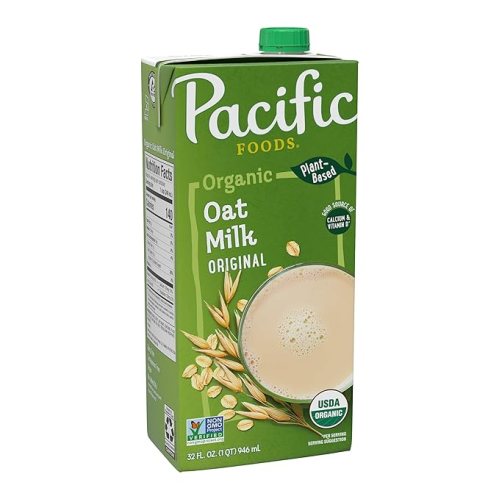
Pacific Foods Original Organic Oat Milk — $5.00
It can be tricky to find fortified products in the organic alternative milk market, but Pacific Foods has delivered with an oat milk that contains more vitamin D than unfortified cow’s milk. This alt milk has a modest amount of both vitamin D and calcium as well as a tasty subtle oat flavor and velvety texture. It’s also sold at room temperature so it can safely be stored at room temperature for months without the threat of spoilage, unlike many other options.
Nutrition facts (per serving size of 1 cup)
- Calories: 140 calories
- Protein: 4 g
- Carbohydrates: 26 g
- Fiber: 1 g
- Added sugars: 13 g
- Fat: 2 g
- Saturated fat: 0 g
- Cholesterol: 0 mg, 0% DV
- Vitamin D: 2 mcg, 13% DV
- Calcium: 120 mg, 10% DV
Pros:
- USDA Certified Organic
- Shelf-stable product that you can stock up on without fear of the product expiring
- Widely available
Cons:
- Lower calcium and vitamin D content compared to other brands
- Highest carbohydrate and added sugar content of the bunch
- No added B vitamins or vitamin A
Sign up for the Well+Good SHOP Newsletter
Get exclusive deals on wellness, beauty, fitness, and food products that have been hand-picked by our editors.
Got it, you've been added to our email list.
